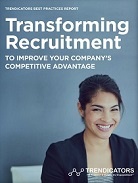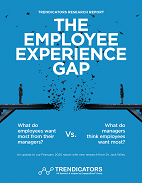
 Over the past several years, Employee Experience has become a term beloved in HR circles, particularly among HR consultants and platform providers. Broader than Engagement, Employee Experience is meant to encompass everything an employee sees, hears, feels and believes about their employment. Employee Experience has gained widespread use and acceptance, returning more than 600M hits on Google compared with 387M hits for Employee Engagement.
Over the past several years, Employee Experience has become a term beloved in HR circles, particularly among HR consultants and platform providers. Broader than Engagement, Employee Experience is meant to encompass everything an employee sees, hears, feels and believes about their employment. Employee Experience has gained widespread use and acceptance, returning more than 600M hits on Google compared with 387M hits for Employee Engagement.
Overlooked Influences: Unfortunately, two factors are often overlooked when it comes to influencing employee experiences. The first is what employees actually want from their experience with an employer over the course of their career. The second—and quite possibly most important—overlooked factor is the role of the manager in influencing employees’ career experiences.
The Employee Experience Gap: In February 2020, we tackled this subject in one of our most popular reports, What Employees Want Most From Their Manager. Based on ground-breaking research by Dr. Jack Wiley, Engage2Excel Group’s chief scientific officer, The Employee Experience Gap is an update to that report with important new insights based on a survey of 1,000 managers in the U.S. conducted during the current pandemic. In that survey, Dr. Wiley asked managers what they thought employees wanted most from their managers. The results show that significant gaps exist in five of the eight attributes that employees value most in a manager.
Download the report to learn about:
- The five behaviors, one skill and two values that determine perceived managerial effectiveness worldwide
- The 67% correlation between the ratings of the eight attributes employees value most in a manager and the management effectiveness scores from 180-degree performance ratings
- The gaps that exist between what employees want most and what managers think they want most
- Four ways that every manager can immediately improve their effectiveness
Employee Experience Matters Now More Than Ever: The devastating health and economic impacts of the pandemic have spotlighted the need for organizations to focus on helping managers understand what employees want and need. Dr. Wiley’s research, which will be presented in his upcoming book, The Employee-Centric Manager, addresses an important link missing in most corporate programs. Organizations spend millions of dollars on programs to recruit, recognize and incentivize employees often with little regard for the manager. The manager, however, is the individual with the greatest influence on employee engagement, performance and retention. Employee-centric managers are generally more capable of solving almost all challenges facing them. They know how to connect with employees, keep them on track, ensure they feel recognized and rewarded and help them achieve or exceed performance expectations.
Minding the Employee Experience Gap: If your organization has been overlooking the role of the manager in its recognition and recruiting programs, it’s time to rethink the role of HR in helping managers create more meaningful and relevant “in-the-moment” experiences for candidates and employees.



